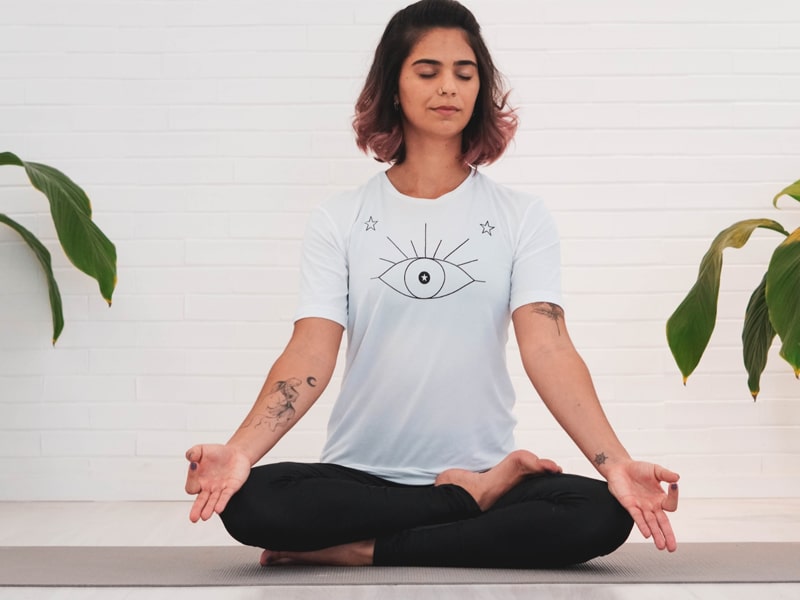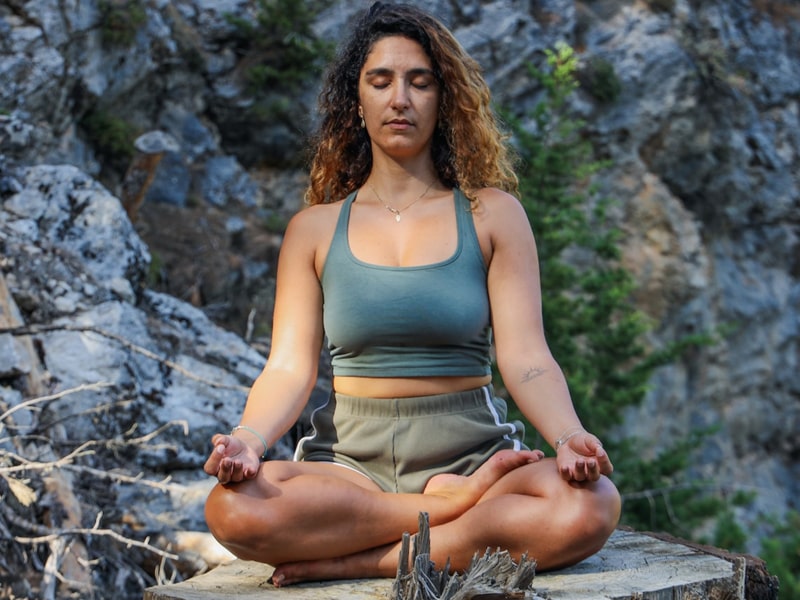What is yoga?
Yoga is a physical, mental, and spiritual discipline that originated in ancient India. It involves a series of physical postures, breathing techniques, meditation, and ethical principles aimed at improving overall health and well-being. Yoga is often practiced for its physical benefits, such as increased flexibility, strength, balance, and reduced stress, but it also has mental and spiritual benefits. The practice of yoga is designed to unify the mind, body, and spirit, and to help individuals achieve a sense of inner peace, clarity, and calmness. There are many different types of yoga, each with its own set of postures and techniques, and yoga can be practiced by people of all ages and fitness levels.
Major benefits of yoga
-
Improves flexibility :- Yoga involves various stretches and poses that help to increase flexibility and range of motion in the body. This is important for maintaining good posture, preventing injury, and performing daily activities with ease.
-
Strengthens muscles :- Many yoga poses require holding the body in certain positions, which helps to build strength and tone muscles. This can help to improve overall physical performance and prevent muscle imbalances.
-
Reduces stress :- Yoga includes breathing exercises and meditation techniques that help to calm the mind and reduce stress. Regular practice of yoga has been shown to lower cortisol levels, which is a hormone associated with stress.
-
Boosts immune system :- Yoga can help to strengthen the immune system by increasing circulation, promoting lymphatic flow, and reducing stress. This can help to prevent illness and improve overall health.
-
Improves balance :- Yoga poses often require balance and focus, which can help to improve balance and stability in everyday life. This is especially important as we age to prevent falls and maintain independence.
-
Increases energy levels :- Yoga can help to increase energy levels by stimulating the body’s natural energy centers and promoting circulation. Regular practice of yoga can also help to improve sleep quality, which can lead to increased energy during the day.
-
Reduces anxiety :- Yoga can help to reduce symptoms of anxiety by promoting relaxation and reducing stress levels. The focus on breathing and mindfulness during yoga can also help to promote a sense of calm.
-
Improves cardiovascular health :- Yoga can help to improve cardiovascular health by increasing heart rate and promoting circulation. This can help to lower blood pressure and reduce the risk of heart disease.
-
Improves digestion :- Many yoga poses involve twisting and stretching the abdominal area, which can help to improve digestion and promote regularity. This can help to reduce bloating, constipation, and other digestive issues.
-
Promotes mindfulness :- Yoga involves focusing on the present moment and being mindful of your thoughts, feelings, and surroundings. This can help to improve mental clarity, reduce anxiety and depression, and promote overall well-being.
-
Improves posture :- Yoga can help to improve posture by strengthening the muscles that support the spine and promoting spinal alignment. This can help to prevent back pain and improve overall physical appearance.
-
Reduces inflammation :- Certain types of yoga, such as restorative yoga, have been shown to reduce inflammation in the body. This can help to reduce symptoms of chronic pain, arthritis, and other inflammatory conditions.
-
Promotes self-awareness :- Yoga encourages self-awareness by promoting mindfulness and focusing on the body and breath. This can help to increase self-esteem and self-acceptance, and promote a sense of inner peace.
-
Reduces symptoms of depression :- Yoga has been shown to reduce symptoms of depression by promoting relaxation, reducing stress, and improving self-awareness. The focus on breathing and mindfulness during yoga can also help to regulate mood and emotions.
-
Improves overall quality of life :- Regular practice of yoga can have a positive impact on physical health, mental health, and overall well-being. By promoting relaxation, reducing stress, and improving physical performance, yoga can help to improve quality of life in many areas.
Also Read :- Yoga And Health Benefits – All You Need To Know
What is meditation?
Meditation is a mental practice that involves focusing one’s mind on a particular object, thought, or activity to achieve a calm and relaxed state of consciousness. It is a technique that has been practiced for thousands of years and is commonly associated with spiritual or religious practices, but it can also be used as a secular technique to promote mental and physical well-being.
The practice of meditation typically involves finding a quiet and comfortable place to sit, closing the eyes, and directing the attention to a particular point of focus, such as the breath, a mantra, or a visualization. As the mind wanders, the practitioner gently brings the focus back to the point of concentration.
The goal of meditation is to cultivate a sense of calmness and relaxation, reduce stress and anxiety, improve concentration and focus, and promote an overall sense of well-being. It can be done for a few minutes a day or for longer periods of time, depending on the individual’s preferences and goals.
There are many different types of meditation practices, including mindfulness meditation, loving-kindness meditation, and transcendental meditation, among others. Each practice has its own unique benefits and techniques, but all are aimed at promoting inner peace, mental clarity, and spiritual growth.
Major benefits of meditation
Meditation has numerous benefits for both mental and physical health. Here are some of the major benefits of meditation :-
-
Reduces stress :- One of the most well-known benefits of meditation is that it helps to reduce stress levels. Meditation can calm the mind, reduce anxiety and depression, and promote a sense of calmness.
-
Improves focus and concentration :- Meditation helps to improve focus and concentration by training the mind to be more attentive and present. This can help to increase productivity and efficiency in work and daily life.
-
Increases self-awareness :- Through meditation, individuals can gain a deeper understanding of their thoughts, emotions, and behaviors. This can lead to greater self-awareness and self-reflection.
-
Boosts immune system :- Research has shown that regular meditation can boost the immune system by increasing the activity of natural killer cells, which are responsible for fighting off viruses and bacteria.
-
Lowers blood pressure :- Meditation has been shown to lower blood pressure, which can reduce the risk of heart disease and stroke.
-
Improves sleep :- Meditation can help individuals who struggle with sleep problems by promoting relaxation and reducing stress.
-
Enhances emotional well-being :- Meditation has been shown to increase positive emotions, such as joy, gratitude, and contentment, while reducing negative emotions, such as anger, anxiety, and depression.
-
Reduces symptoms of anxiety and depression :- Meditation can help to reduce symptoms of anxiety and depression by promoting a sense of calmness and relaxation.
-
Improves cardiovascular health :- Regular meditation can help to improve cardiovascular health by reducing stress and lowering blood pressure.
-
Increases empathy and compassion :- Meditation can increase empathy and compassion towards others by promoting a sense of connectedness and reducing feelings of isolation.
-
Improves memory and cognitive function :- Studies have shown that regular meditation can improve memory and cognitive function, including attention, decision-making, and problem-solving skills.
-
Helps manage chronic pain :- Meditation can help individuals who suffer from chronic pain by promoting relaxation and reducing stress, which can reduce the intensity of pain.
-
Promotes overall well-being :- Meditation promotes overall well-being by reducing stress, increasing self-awareness, and promoting emotional and physical health.
-
Enhances creativity :- Meditation can help to enhance creativity by promoting a relaxed and open mindset, which can lead to new ideas and perspectives.
-
Helps with addiction recovery :- Meditation has been shown to be an effective tool in addiction recovery by promoting self-awareness and reducing stress and anxiety.
What is the diffference between yoga or meditation?
Yoga and meditation are two different practices, but they are often used together and have some overlap in their benefits. Yoga is a physical practice that includes various postures or asanas, breathing exercises, and meditation. The focus of yoga is on strengthening the body, improving flexibility and balance, and calming the mind through physical movements and breathing techniques.
Meditation, on the other hand, is a mental practice that involves focusing the mind on a particular object, thought, or activity to achieve a state of mental clarity and relaxation. The purpose of meditation is to quiet the mind, increase awareness and concentration, and promote relaxation and stress reduction.
While yoga includes meditation as one of its components, it is a more comprehensive practice that also includes physical exercise and breathing techniques. Meditation, on the other hand, is solely focused on calming the mind and achieving mental clarity.
Overall, both yoga and meditation can have many benefits for the mind and body. While yoga is more physically focused and includes meditation, meditation is a mental practice that can be done on its own or as part of a yoga practice.
What are the similarities between yoga or meditation?
Yoga and meditation share many similarities as they are both ancient practices that originated in India and have been practiced for thousands of years. Here are some of the similarities between yoga and meditation :-
-
Mind-Body Connection :- Both yoga and meditation emphasize the connection between the mind and body. In yoga, physical postures (asanas) are used to prepare the body for meditation, while in meditation, the focus is on the mind-body connection to achieve a state of calm and relaxation.
-
Breath Control :- Both practices emphasize the importance of controlling the breath. In yoga, breath control (pranayama) is used to calm the mind and relax the body, while in meditation, breath control is used to help focus the mind and achieve a state of deep relaxation.
-
Inner Awareness :- Both practices encourage inner awareness and introspection. In yoga, the focus is on becoming more aware of the body and its sensations, while in meditation, the focus is on becoming more aware of the mind and its thoughts.
-
Relaxation :- Both practices promote relaxation and stress reduction. In yoga, physical postures and breath control help to release tension in the body, while in meditation, the focus on calming the mind can help to reduce stress and promote relaxation.
-
Mindfulness :- Both practices encourage mindfulness, or the practice of being present in the moment. In yoga, the focus is on being present in the body and the breath, while in meditation, the focus is on being present in the mind and the present moment.
Overall, while there are some differences between yoga and meditation, they share many similarities and are both powerful tools for promoting health, wellness, and inner peace.
Also Read :- Dhanur Asana – A Comprehensive Guide
Yoga or Meditation, which is hard to do?
The level of difficulty between yoga and meditation depends on the individual’s personal experience and preference. Some people may find yoga challenging due to its physical demands and various postures, while others may find meditation challenging due to the need to still the mind and maintain focus.
Both yoga and meditation require practice and patience to master. They also offer a range of benefits for physical and mental well-being, such as reducing stress, improving flexibility and balance, and enhancing concentration and mindfulness.
It’s important to note that yoga and meditation are not competitive activities, and it’s not a matter of one being harder than the other. They can complement each other, and many yoga classes incorporate meditation practices, such as breath awareness and mindfulness techniques, into their sessions. Ultimately, the best approach is to try both and see which practice resonates with you and your goals.
Why Yoga And Meditation Belong Together ?
Yoga and meditation are interconnected practices that complement each other in numerous ways. Both practices have ancient roots in India and have been practiced for centuries for physical, mental, and spiritual well-being. While yoga involves physical postures, breathing techniques, and meditation, meditation is a specific technique that involves focusing the mind and achieving a state of relaxation and inner peace.
Practicing yoga and meditation together can help individuals achieve a holistic approach to their physical, mental, and emotional health. Yoga helps to build physical strength, improve flexibility, balance, and stamina, while meditation helps to calm the mind, reduce stress and anxiety, and increase focus and concentration.
The physical practice of yoga, which involves postures or asanas, helps to release tension and stress from the body, creating a sense of relaxation and calmness. This state of relaxation can be further enhanced by practicing meditation, which helps to quiet the mind and reduce the negative effects of stress and anxiety.
Meditation can also help to deepen the benefits of yoga by enhancing one’s awareness and focus during yoga practice. By practicing mindfulness during yoga, individuals can better connect their mind, body, and breath, leading to improved physical and mental health outcomes.
In addition, both yoga and meditation have been found to have a positive impact on overall well-being, reducing stress, anxiety, depression, and improving sleep quality, mood, and cognitive function.
Therefore, practicing yoga and meditation together can help individuals achieve a well-rounded approach to their physical, mental, and emotional health and can be a powerful tool for self-improvement and personal growth.
Why yoga is much better than meditation?
It is not accurate to say that yoga is better than meditation, or vice versa. Both practices offer unique benefits and can be complementary to each other. Yoga involves physical postures, breathing techniques, and meditation, while meditation focuses on quieting the mind and cultivating mental awareness and clarity.
Yoga can be more beneficial for those who want to improve their physical health and flexibility, as it includes various physical postures and movements that can help with strength, balance, and flexibility. Additionally, the breathing exercises in yoga can help reduce stress and improve overall health.
On the other hand, meditation can be more beneficial for those who want to improve their mental health and emotional well-being. It can help reduce anxiety and depression, increase focus and concentration, and improve overall mental clarity and awareness.
Ultimately, the choice between yoga and meditation depends on an individual’s personal goals and preferences. Some people may find that a combination of both practices is most beneficial for them.
Benefits of doing Yoga and Meditation both regularly?
Doing yoga and meditation regularly can have numerous benefits for both physical and mental health. Here are some of the benefits of practicing yoga and meditation together :-
-
Stress relief :- Both yoga and meditation have been shown to reduce stress levels by calming the mind and relaxing the body.
-
Improved flexibility :- Yoga helps to improve flexibility and mobility, making it easier to move the body and prevent injuries.
-
Better sleep :- The calming effects of yoga and meditation can help to promote better sleep and improve sleep quality.
-
Enhanced mental focus :- The combination of yoga and meditation can improve concentration and mental focus, leading to greater productivity and performance.
-
Reduced anxiety and depression :- Regular practice of yoga and meditation has been shown to reduce symptoms of anxiety and depression by improving mood and increasing feelings of wellbeing.
-
Improved cardiovascular health :- Yoga and meditation have been linked to improved cardiovascular health by reducing blood pressure, improving circulation, and reducing the risk of heart disease.
-
Boosted immune system :- Practicing yoga and meditation regularly can boost the immune system, helping to fight off illnesses and infections.
-
Increased strength and balance :- Yoga helps to build strength and balance, which can help to prevent falls and injuries as we age.
-
Improved digestion :- Certain yoga postures and breathing techniques can improve digestion and alleviate digestive issues such as bloating and constipation.
Overall, practicing yoga and meditation together can have numerous benefits for both physical and mental health. By combining these two practices, individuals can enhance their overall wellbeing and lead a healthier, more balanced life.



